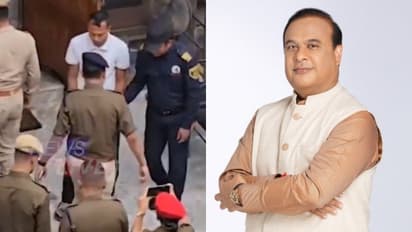Video shows private guards frisking Assam cops, CM defends, gets schooled (WATCH)

Synopsis
Assam CM defended police being frisked before a search, citing legal provisions, but X users questioned if the same applies to common citizens. Critics slammed perceived double standards, misinterpretation of law, and broader concerns in Assam.
A video showing Assam Police officers being frisked by private security guards before searching the residence of USTM owner Mahbubul Hoque sparked debate online. The businessman was recently arrested for facilitating mass cheating in CBSE exams and alleged fraud.
After the footage went viral, Assam CM defended the act, citing Section 100(3) of the CrPC, which grants residents the right to request a search of officers before their premises are inspected.
However, X users quickly challenged his interpretation, questioning whether ordinary citizens would receive the same treatment. Critics accused him of misrepresenting the law and pointed out perceived double standards in law enforcement.
Some also highlighted broader concerns about Assam’s socio-political landscape, linking the incident to historical narratives of demographic changes in the state.
Also read: Mayawati drops Akash Anand as successor in major BSP leadership shake-up
Assam Chief Minister Himanta Biswa Sarma faced criticism on social media after citing Section 100(3) of the Code of Criminal Procedure (CrPC), 1973, to justify private security personnel frisking Assam Police officers during a search operation at the residence of Mahbubul Hoque, Chancellor of the University of Science and Technology Meghalaya (USTM). Hoque had been arrested earlier for allegedly facilitating mass cheating during CBSE examinations and committing fraud.
In his post, CM Sarma stated that under Section 100(3) of the CrPC, a homeowner has the right to request that police officers be searched before they conduct a search of the premises.
However, some social media users challenged this interpretation, pointing out that Section 100(3) actually pertains to the search of individuals present at the location who are suspected of concealing items sought in the warrant. The section does not grant residents the authority to frisk law enforcement officers.
Another advised, "If you don't know how to interpret the law, please don't say incorrect things in public."
Besides, one user questioned, "Will police agree to it when searching the premises of ordinary citizens?" Some users expressed skepticism about the application of such legal provisions, suggesting that enforcement varies based on an individual's influence. Many pointed out that 'CRPC,1973 is no longer valid since 2024. The Central Government replaced it with BNS.'
This incident has sparked a broader debate on the interpretation of legal statutes and the conduct of law enforcement during search operations.
Stay updated with the Breaking News Today and Latest News from across India and around the world. Get real-time updates, in-depth analysis, and comprehensive coverage of India News, World News, Indian Defence News, Kerala News, and Karnataka News. From politics to current affairs, follow every major story as it unfolds. Get real-time updates from IMD on major cities weather forecasts, including Rain alerts, Cyclone warnings, and temperature trends. Download the Asianet News Official App from the Android Play Store and iPhone App Store for accurate and timely news updates anytime, anywhere.